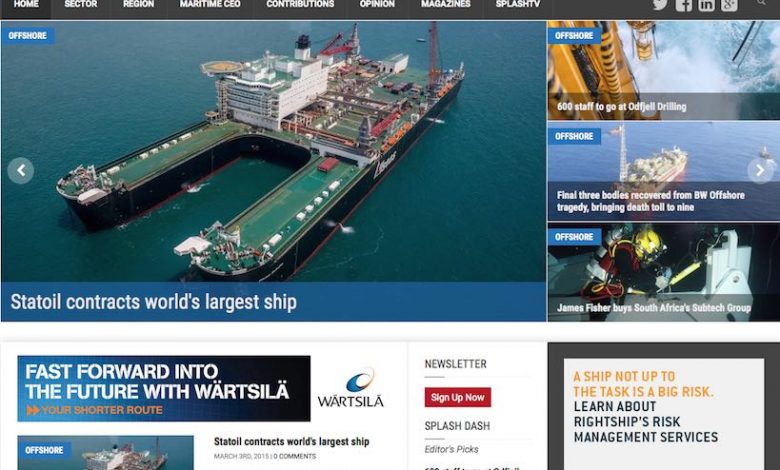
Splash turns one: ‘A year that proved shipping investors can’t take anything for granted’
Many friends questioned my colleague Grant Rowles and I when we set about launching a global shipping news site. Last March, the industry remained mired in debt – and the shipping media landscape had ballooned to silly levels. One year on to the day, we reckon we could not have picked a better time to have made our entrance.
Hard-nosed, concise, free news had been in short supply for shipping until Splash came along. With journalists across the world – and without fear or favour – Splash has quickly made a name for itself with a string of exclusives and access to the top names in shipping.
The 12 months we’ve been operating have been among the most turbulent in the history of shipping, which as a journalist I must admit makes for good, exciting copy day in, day out. The volatility is evidenced by the supporting graphs provided from VesselsValue.com at the bottom of the article that look at the three main sectors over the past 12 months since Splash started.
Rather than me trying to tell you the mood of the industry these past 12 months and the likely short-term future I got in touch with regular contributors. Dr Martin Stopford, president of Clarkson Platou Research Services, reckons the last 12 months were: “A year that proved shipping investors can’t take anything for granted. The famous analyst adds: “Oil, dry bulk, tankers all seemed to abandon economic logic.”
No less flabbergasted by the actions of owners of late is Paul Slater, a famous name in ship finance and chairman of First International Corp.
“The shipping markets over the past 12 months,” he says, “reflect the stupidity of buying ships without any certainty of employing them profitably. The next 12 months will see the collapse of numerous publicly reporting companies and hopefully the exodus of the private equity and hedge fund investors. ”
Dagfinn Lunde, Splash’s finance columnist, agrees with Slater’s “stupidity” viewpoint. Owners should have seen the crisis coming more clearly, he tells me. What’s more, Lunde is adamant 2016 will be worse than last year.
“Bulker prices have nearly halved in the last 12 months, as have offshore assets and plenty of owners tell me prices could still come off further,” the ship finance veteran says.
Peter Sand, BIMCO’s chief shipping analyst, also believes shipping should have seen the trainwreck coming sooner. “Reality has hit home in the shipping industry in the past 12 months,” he says. “The changes to trade, patterns and volumes have been within sight for some time – but really started to affect shipping in 2015.”
The “new normal”, according to Sand, will result in a lower level of shipping demand growth going forward.
Clay Maitland, Splash’s most prolific opinion writer, has this to say on the biggest news from the last year.
“I think that the biggest story is the virtual bankruptcy of major bulk transport owners/operators,” he says, adding: “I have concluded that a recovery in the dry bulk sector is likely, and indeed certain, to be partial at best. The severe dry bulk recession has in fact disrupted long-established patterns of trade; when a recovery comes, we will find that many dry bulk importers have established domestic and land-based sources of supply.”
Andrew Craig-Bennett, Splash’s lead opinion writer, takes issue with all those who claim dry bulk is at its lowest point ever – compared to the 1930s, it’s a cakewalk, he contends.
“We are told that, so far as dry bulk carriers are concerned, the past year has been as bad as the sector has ever experienced,” Craig-Bennett recounts. “I take leave to doubt this, because the statement relies on Baltic Index data, and whilst I am sure that data is carefully compiled and as accurate as it can be made, I am not sure that the BFI for 2016 is really an apples for apples comparison with the BFI for 1986.”
Ship operating costs are different now, Craig-Bennett notes and more pertinently there was no Baltic Index in the 1930s, when things were so bad that, famously, one British tramp ship sailed from its home port with a crew consisting entirely of officers – who had signed on as ratings to preserve their right to a company pension.
Craig-Bennett continues: “There is an odd aspect to this dry bulk recession – which is so bad that ships loading in Chile for Europe are being routed round the Horn to save Panama Canal dues equal to ten days’ hire and steaming – and it is that, as everyone concerned with bulk ships knows, the ports in most places are congested. The dry bulk sector is so overbuilt that even port congestion does not help.”
Shipowners generally have not paid sufficient attention to the increase in productivity in shipbuilding, Craig-Bennett reckons. A handy bulker today can be built for between a half and a third of the man hours needed to build such a ship in the 1980s, he points out.
As for the immediate future – the “process of attrition”, as Craig-Bennett puts it, will work on the surplus ships and, more important, the surplus shipyards.
Looking further ahead, Craig-Bennett, never one to shy away from big statements, says: “Taking the long, long view of shipping, its SNAFU. Recession due to overtonnaging is the default condition of the global shipping industry.”
However bad the industry gets the team at Splash will be on hand to delve and deliver all the latest from around the world. We’re very grateful to all readers – especially those who have contributed comments or taken to social media as well as our supportive raft of advertisers.